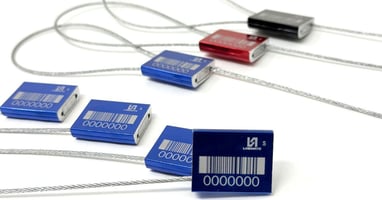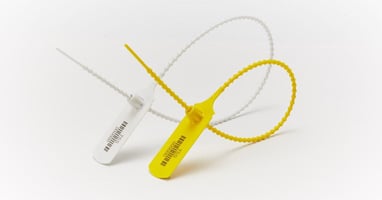With billions of dollars’ worth of goods frequently being transported across various channels, the...
How To Find the Right Security Seal for Your Shipments

Securing shipments upholds the integrity of goods during transit. It involves protecting the physical condition of the items and guaranteeing that they reach their destination without harm.
Selecting the right security seal for your shipments can prevent tampering, theft, and unauthorized access, offering an additional layer of security. Continue reading to learn the types of seals available, the value of various goods, and more.
1. Understand the Types of Security Seals
Every type of seal serves a unique purpose. Let’s begin by gaining an understanding of the most common security seals.
Bolt and Cable Seals
Bolt and cable seals are heavy-duty barriers designed for high-security applications. They seal shipping containers and are ideal for international shipments. The robust metal pin and locking mechanism make these seals extremely difficult to tamper with or remove without specialized tools.
Plastic Seals
Plastic tamper-proof seals are versatile and come in various designs, including pull-tight seals and fixed-length seals. These are ideal for securing bags, boxes, and smaller containers. They aren’t as strong as bolt seals; however, the tamper-proof qualities make them suitable for less high-risk shipments.
RFID Security Seals
RFID security seals add an extra layer of security by incorporating radio-frequency identification technology. They provide increased efficiency for high-volume shippers and receivers.
These seals require an RFID scanner to trace the seals as they enter or leave a facility for real-time tracking. As a result, you eliminate human error in logging and tracking for a more reliable shipment process.
Smart Lock
Smart locks are the latest development in security seals. Distributors favor them because they offer the highest level of security for all shipments. These devices are weather-resistant, have a long battery life, offer real-time alerts, and feature GPS tracking.
Furthermore, smart lock seals offer remote authorization to open them at any point. Additionally, the devices capture who locked or unlocked the device, the location of use, and the time the event occurred. These specific details and real-time tracking are exceptionally advantageous to establish if there are any complications in the supply chain.
Like RFID security seals, smart locks decrease the risk of human error. Shipments are more likely to reach their destination without theft or tampering when using smart locks.

2. Establish the Security Needed for the Shipment Area
You might assume that high-value goods demand stronger security measures than low-cost products. The truth is that goods of all values are at risk. Therefore, the level of security you need depends on the likelihood of theft in the shipment area.
Bolt, cable, and RFID security seals offer maximum protection to withstand unauthorized access. Plastic seals are suitable for areas where theft isn’t common in the shipment region.
3. Pick a Security Seal With Tamper-Proof Features
All security seals have varying levels of tamper-resistant features. Strong materials, from metal to hardened plastic, are essential. RFID chips will record tampering attempts, while the smart lock contains sensors that will instantly send an alert. Plastic security seals have a plastic locking core and a barcode that makes it incredibly difficult to meddle with the shipment.
Be sure to talk to a security seal expert about the functionality of each seal before implementing the devices into your shipments. For example, not all plastic truck seals possess the same level of tamper resistance. Consult the experts at Logimate for more insight so that you can provide comprehensive protection of transported goods.
4. Learn How To Administer and Track Serial Numbers
Implementing serial numbers on your security seals is essential for tracking and ensuring inventory accuracy. Serial numbers provide a unique identifier for each seal, enabling precise monitoring and validation throughout the shipping process.
The procedure of administering serial numbers is essential for the security seals to function properly. Here’s some insight into how to establish serial numbers and the common types used.
Applying a Serial Number to a Shipment
Once you have the proper security seal ready for the shipment, you must instantly record the serial number. Receivers will look for the precise number, seal type, color, and printing. This helps them understand what to expect from the shipment once it arrives. Plus, it helps them determine if tampering occurred during transit if the seal doesn’t precisely match the description.
Types of Serial Numbers
Printed Serial Numbers
An effective approach is printing unique serial numbers directly onto the seals. This is most effective for plastic seals.
The clear visual identification eliminates the need for additional labeling processes. Distributors can manually record the numbers or use digital systems that permit flexibility.
RFID Tags
Incorporating RFID tags with embedded serial numbers offers advanced tracking capabilities. RFID technology enables real-time monitoring and automated data collection. It’s useful for high-volume operations where efficiency and speed are paramount. RFID tags can store more information than traditional barcodes, providing enhanced detail and control over your shipment tracking.
Digital Tracking Systems
Implementing digital tracking systems that integrate with existing inventory management software offers a comprehensive solution. These systems can automatically record serial numbers as items pass through different stages of the shipping process. This offers real-time data updates, detailed reporting, and proper inventory management.

5. Consider the Conditions the Shipping Container Will Endure
The next component of finding the right security seal for shipments is understanding which security seals correspond with environmental conditions. Let’s go over which conditions each seal can withstand.
Metal Security Seals
Metal security seals are ideal for environments with substantial temperature fluctuations because they can handle extreme hot and cold weather. They are resistant to corrosion, ensuring longevity even in humid or wet conditions. This makes them particularly suitable for transportation by sea or in areas prone to heavy rain.
Plastic Security Seals
Plastic seals offer a different set of advantages and limitations. While they are lightweight and flexible, their performance depends on the specific type of plastic used. Standard plastic seals may not endure prolonged exposure to UV light and will grow brittle in extreme cold.
However, high-quality plastic seals offer UV resistance and will hold up better in outdoor settings.
6. Test the Security Seal Before Full Implementation
Before rolling out a new security seal across your entire operation, test its effectiveness. Start with a controlled trial to evaluate how well the seal performs under real-world conditions. This step can help you identify any potential weaknesses in the seal’s design.
Monitor the seal for durability. It should withstand the rigors of shipping, including rough handling and exposure to various environmental factors. Check for any signs of wear or tampering during the trial period. A seal that shows premature wear might compromise the security of your shipments.
Gather feedback from your logistics team. Those who handle the seals daily can provide invaluable insights into their practicality and reliability. Their input can help you make necessary adjustments before full-scale implementation, ensuring that the chosen seal meets all operational requirements.
Let Logimate Keep Your Shipping Operations Secure
The safety and integrity of goods is of the utmost importance. To guarantee protected products no matter their value, browse the security seals at Logimate. We have a wide array of tamper-proof designs ready to meet your distributing demands.


.jpg?height=200&name=Logimate-334388-RFID-Shipment-Seals-Blogbanner2%20(1).jpg)

